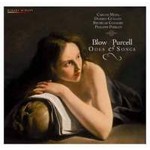
Odes & Songs
 $41.00
Out of Stock
$41.00
Out of Stock6+ weeks add to cart
PURCELL / BLOW
Odes & Songs
Carlos Mena & Damien Guillon (countertenors) & Philippe Pierlot (bass viol, direction) / Ricercar Consort
[ Mirare / CD ]
Release Date: Sunday 10 October 2010
This item is currently out of stock. It may take 6 or more weeks to obtain from when you place your order as this is a specialist product.
"Sound is colorful, vivid, and nicely placed among the instruments, with an excellent balance and well-nigh perfectly judged sense of proportion. These songs are among Purcell's best, and the Blow has never been recorded better, so this gets an easy recommendation-and no one is more surprised than me." (AudAud Jan 2011)
"On the whole this release is exemplary; the Ricercar Consort is spot on in its interpretations of the Purcell idiom, always sprightly and technically flawless, but at the same time quite relaxed and free-flowing when the moment calls for it. Maybe it's the intimate setting with the counter tenors, but I do not detect the same sort of struggling projection issues that I normally hear, and both voices are engaging and quite harmonious to the ear, a nice change. Sound is colorful, vivid, and nicely placed among the instruments, with an excellent balance and well-nigh perfectly judged sense of proportion. These songs are among Purcell's best, and the Blow has never been recorded better, so this gets an easy recommendation-and no one is more surprised than me." (AudAud Jan 2011)
There is no record of how Purcell's unprecedented youthful genius was received by his contemporaries, though it seems logical that it must have caused considerable wonder in the musical world centred around Westminster. The reality of London musical life was in fact difficult, frenetic, and grossly underfunded, and, along with the whole city, was thrown into confusion with the outbreak of the plague, the war with the Dutch and the catastrophic fire of London. Suffice it to say that a lifelong friendship developed with John Blow, who relinquished his post as organist at Westminster Abbey to the 20-year old Purcell in 1679.
Blow's music in the Ode on Purcell's death is probably the most coherent melodious and inventive, outside his beloved Church music. It is also his most Purcellian. The choice of two countertenor voices was fundamental in this respect, and this conscious evocation of the Purcellian sound world is extended in the use of the two recorders, stressing both the funerary and other-worldly associations of the instrument. With this collaboration in memory of Purcell however, he achieves the highest level of expression. Early death, in his time was an unremarkable commonplace, and Dryden and Blow are deploring something rather different, the catastrophe of losing a friend who represented both their own hopes, and the energy and potential of English music in full flood.
Tracks:
Blow:
Ode on the Death of Mr Henry Purcell
Purcell:
Here let my life
But ah, I see Eusebia drown'd in tears
Symphony for the Flutes
Strike The Viol (Ode Come Ye Sons Of Art Away)
Her charming strains
Chaconne
A Song in the Prophetess
No, resistance is but vain
Sweetness of nature
I loved fair Celia Z381